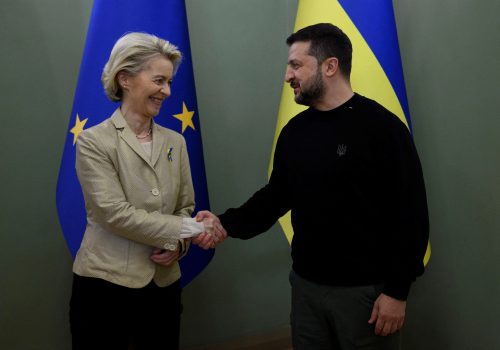Don’t stop now. US aid to Ukraine continues to be a wise investment.
The allocation of US military assistance to Ukraine stands as the most strategic defense investment in at least two decades. Congress’s refusal so far to bring to the floor President Joe Biden’s supplemental budget request—which includes $61.4 billion in additional Ukraine funding—is a significant error. The synergy of US aid with Ukrainian courage and resilience has yielded success on multiple fronts. Withholding additional support for Kyiv at this critical juncture would not only harm the ongoing war effort but also diminish US global standing, injecting uncertainty into the world.
Total US assistance to Ukraine since Russia’s illegal invasion in February 2022 is a modest seventy-five billion dollars. The United States spent trillions of dollars on the wars in Iraq and Afghanistan, with very little to show by way of positive developments in either campaign. In stark contrast, Kyiv has judiciously utilized US and international assistance to significantly weaken what the US Department of Defense calls a “near-peer competitor.”
Since the conflict’s onset, Russia has suffered, according to one report, the loss of 11,000 pieces of battlefield equipment, including 1,300 main battle tanks destroyed and 548 captured by Ukraine. Additionally, Ukraine is reported to have taken down 1,600 infantry fighting vehicles, more than 200 armored personnel carriers, 100 helicopters, and 75 combat aircraft. Despite lacking a substantial navy, Kyiv has even sunk eight Russian warships, including the flagship Moskva, a Slava-class guided missile cruiser named after the Russian capital. Beyond the material losses, the Kremlin has incurred significant personnel casualties.
If Russian President Vladimir Putin is not defeated on the battlefield now, it will cost the United States far more to deter and defend against future Russian aggression.
With an estimated 120,000 soldiers killed in action and 170,000 injured, Russia’s personnel losses have been staggering. And Russia’s losses are not just constrained to enlisted men—seven Russian generals have been killed on the battlefield, including Roman Kutuzov, leader of the Fifth Combined Arms Army, central to the assault on Ukraine. As retired general and former Central Intelligence Agency Director David Petraeus put it, Ukraine is “picking them off left and right.” Equally critical is the loss of more than eight hundred junior officers, essential for executing tactical maneuvers within larger battalion and brigade efforts. The absence of these young officers weakens Russia’s combat effectiveness in the short term and threatens its ability to form coordinated, effective fighting units as it calls up more enlisted personnel. However, the impact of US aid to Ukraine extends far beyond the battlefield.
Firstly, the aid underscores the United States’ commitment to upholding international law and the established liberal world order, countering perceptions of a retreat from global leadership. This sends a powerful signal to those seeking to revise the international order that there will be a significant price to pay should they attempt to do so. Ideally, adversaries’ belief in US resolve will make the United States’ global deterrence posture more believable and effective. Secondly, aid to Ukraine reassures friends and allies worldwide, projecting stability and security. A perception of US unreliability could prompt allies to pursue independent security measures, risking nuclear weapons proliferation and regional arms races—neither of which are in the United States’ interest.
Cutting off aid to Ukraine, as some in Congress propose, would undermine the immediate war effort in Europe and diminish the deterrent power of US military force globally. A solid 61 percent of Americans support assistance to Ukraine, according to a September 2023 poll by the Chicago Council on Global Affairs. Nor is the United States alone in its support. European countries and European Union (EU) institutions have collectively pledged more than $145 billion in aid since the beginning of Russia’s full-scale invasion of Ukraine. In the coming year the United States should work closely with European allies and the EU to set up a longer-term plan for Ukrainian economic development, with Europeans shouldering a large part of that effort.
But such a process must be planned, and abruptly cutting Kyiv off at the knees right now is not the answer. Doing so would incentivize Russia to stay the course and invite future trouble. If Russian President Vladimir Putin is not defeated on the battlefield now, it will cost the United States far more to deter and defend against future Russian aggression. While fiscal responsibility is commendable, the failure to provide Kyiv with an additional $61.4 billion to uphold the liberal world order and significantly degrade the Russian military is a short-sighted decision with far-reaching consequences for national security.
Michael John Williams is a nonresident senior fellow with the Transatlantic Security Initiative in the Atlantic Council’s Scowcroft Center for Strategy and Security and associate professor of International Affairs and director of the International Relations Program at the Maxwell School for Citizenship and Public Affairs at Syracuse University.
Further reading
Sat, Nov 25, 2023
Many Ukrainians see Putin’s invasion as a continuation of Stalin’s genocide
UkraineAlert By Kristina Hook
Many Ukrainians see today’s ongoing Russian invasion as a continuation of the Stalin regime’s genocidal attempts to eradicate Ukrainian national identity and destroy the Ukrainian nation, writes Kristina Hook .
Tue, Nov 21, 2023
Wartime Ukraine is making historic progress toward EU membership
UkraineAlert By Mark Temnycky
The Ukrainian authorities have made clear they view EU membership as a strategic priority and are fully committed to pursuing this goal, even while defending themselves against Russia’s ongoing invasion, writes Mark Temnycky.
Fri, Nov 17, 2023
David Petraeus on how the US should manage a world of overlapping crises
New Atlanticist By Katherine Walla
Petraeus discussed how conflict and deterrence have changed—and what those changes mean for Russia’s war in Ukraine and the Israel-Hamas war.
Image: Ukraine’s President Volodymyr Zelenskiy listens to Commander of the Ground Forces colonel general Oleksandr Syrskyi as he visits a position of Ukrainian servicemen in the town of Kupiansk, amid Russia’s attack on Ukraine, in Kharkiv region, Ukraine November 30, 2023. Ukrainian Presidential Press Service/Handout via REUTERS





